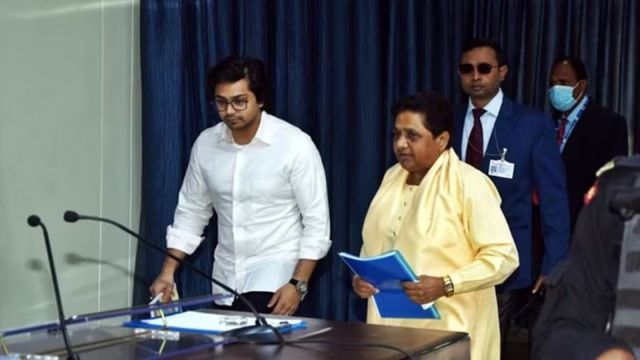
The Bahujan Samaj Party (BSP) and Mayawati signify the once ascendent Dalit discourse that has been on a terminal electoral decline since 2014 in Uttar Pradesh. A panoramic look reveals that of all the reasons cited for the BSP’s decline, the autocratic nature of Mayawati’s leadership style and the refusal to declare a worthy successor are perceived as the two prime determinants. This sentiment is shared by former party veterans like Babu Lal Kushwaha, Nasimuddin Siddiqui and Swami Prasad Maurya as well as a new generation of Ambedkarite leaders from the state like Shrvan Kumar Nirala and others who left the party to pursue Dalit politics independently. The same has been the dominant mode of analysis in media and academia. However, once we change the vantage point and analyse the BSP question from the perspective of the party workers, the picture changes diametrically. Their infallible faith in Mayawati remains a constant fact.
This diametrically opposite framing of the BSP and Mayawati emerges most starkly in the backdrop of the ebb and flow of Akash Anand inside the party. Being the nephew of Mayawati, Anand, who is just 30, has been perceived as her potential successor at a time when the core support base of the party faces a formidable challenge from another young and dynamic leader, Chandra Shekhar Azad. Anand was declared the national coordinator of the BSP after the 2019 Lok Sabha election. In December 2023, Mayawati formally announced him as her political heir. Being an MBA graduate from a UK university, Anand heralded a new phase of politics inside the BSP by being more relatable to the Dalit youths who want the party to shift from the centrality of self-respect to the politics of aspiration. He has been quite vocal, speaks extempore, is at ease in both English and Hindi, and brought new elements like the padyatra (the 14-day ‘Sarvajan Hitay, Sarvajan Sukhay’ Sankalp Yatra in August 2023) to the party. Hence, the new heir wasn’t just more relatable to Gen-Z Dalits; he also sought to structurally readjust the party. However, in the midst of the 2024 Lok Sabha election, he was suddenly divested of his party position, only to be reinstated before the Haryana and Maharashtra Assembly elections — a position again taken away on Sunday, followed by his expulsion from the party on Monday.
This chain of events throws up an analytical puzzle that’s not just about deciphering Anand’s tumultuous equations with Mayawati but also understanding the psychology of the BSP’s core when the party is facing an existential crisis.
Reliable political gossip suggests that Anand was removed as he, along with his father-in-law, Ashok Siddharth, and wife, Pragya Siddharth, were trying to capture the party systematically. The triad, as the account suggests, had vested interests and disrespected the emotional legacy of the party. In short, they were people in a hurry, and therefore, had to pay the price.
On the other hand, accounts more critical of Mayawati say that the rise of any formidable, popular leader in the party causes her insecurity, and therefore that Anand’s bold initiatives and functioning style triggered her anxiety. Many insiders say she has been following this template since the early 1990s and that therefore, one should not be surprised.
However, too much reliance on the personal psychology of the leader may not present a bottom-up picture, from the vantage point of the existing core voters, particularly of a party whose future is a matter of deep anxiety among the adherents.
It is testimony to the resilience of the BSP that in spite of being written off in the 2024 Lok Sabha election in Uttar Pradesh, the party secured more than 80 lakh votes, which overwhelmingly came from her caste, the Jatavs, and the Ravidasis. These voters are rational but have an emotional connect to the party, which rose through the 1980s and tumultuous 1990s and captured power in Hindi heartland in 2007 on its own, besides emerging as a national party. To them, Behenji (Mayawati) is the last living connection to this remarkable journey, without whose persona Kanshi Ram’s BSP wouldn’t have had the political success it witnessed. One may dismiss these voters as the captive support base of the party. However, contrary to the liberal rationality, they represent the psychology of the subalterns who seek the presence of a strong leader even in the difficult times the BSP is facing at present.
To millions of these supporters in general and the workers and cadres in particular, Mayawati remains the most relatable and familiar, as well as a symbol of the resilient discourse of assertive Dalit identity, her dwindling leadership notwithstanding. To them, leaders like Chandra Shekhar Azad do not represent the institutional sense of Dalit discourse that Kanshi Ram advocated. Similarly, Anand and others are saplings that need long-term nurturing under Mayawati before they can have a claim on the structural readjustment of the party. It’s a discourse whose anchor is permanent in her lifetime as she is the last living connection to the transformation of the Bahujan movement into a national party. And normatively, in the difficult phase, the party and the leadership of the BSP must be guided by the sensibilities of the core. Hence, there is a strong possibility that by removing her declared political heir — her nephew — Mayawati has reached out to the rank and file with the message that every worker has a fair claim to the party. This way, she may have emerged stronger among her core supporters.
The writer is a fellow at the Prime Ministers’ Museum and Library. He is director of PRACCIS, a Delhi based research institution specialising in fieldwork-based study of Indian politics.